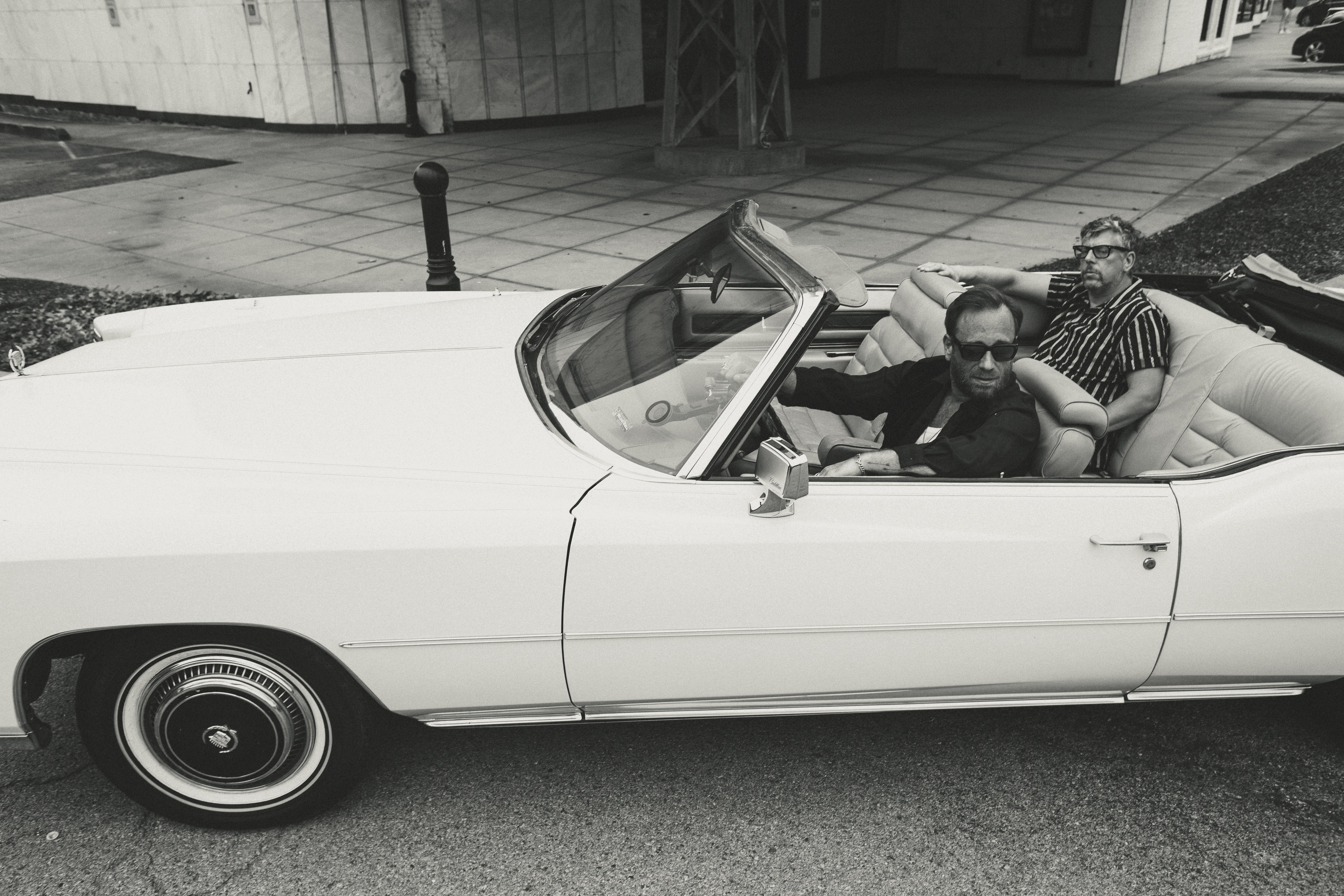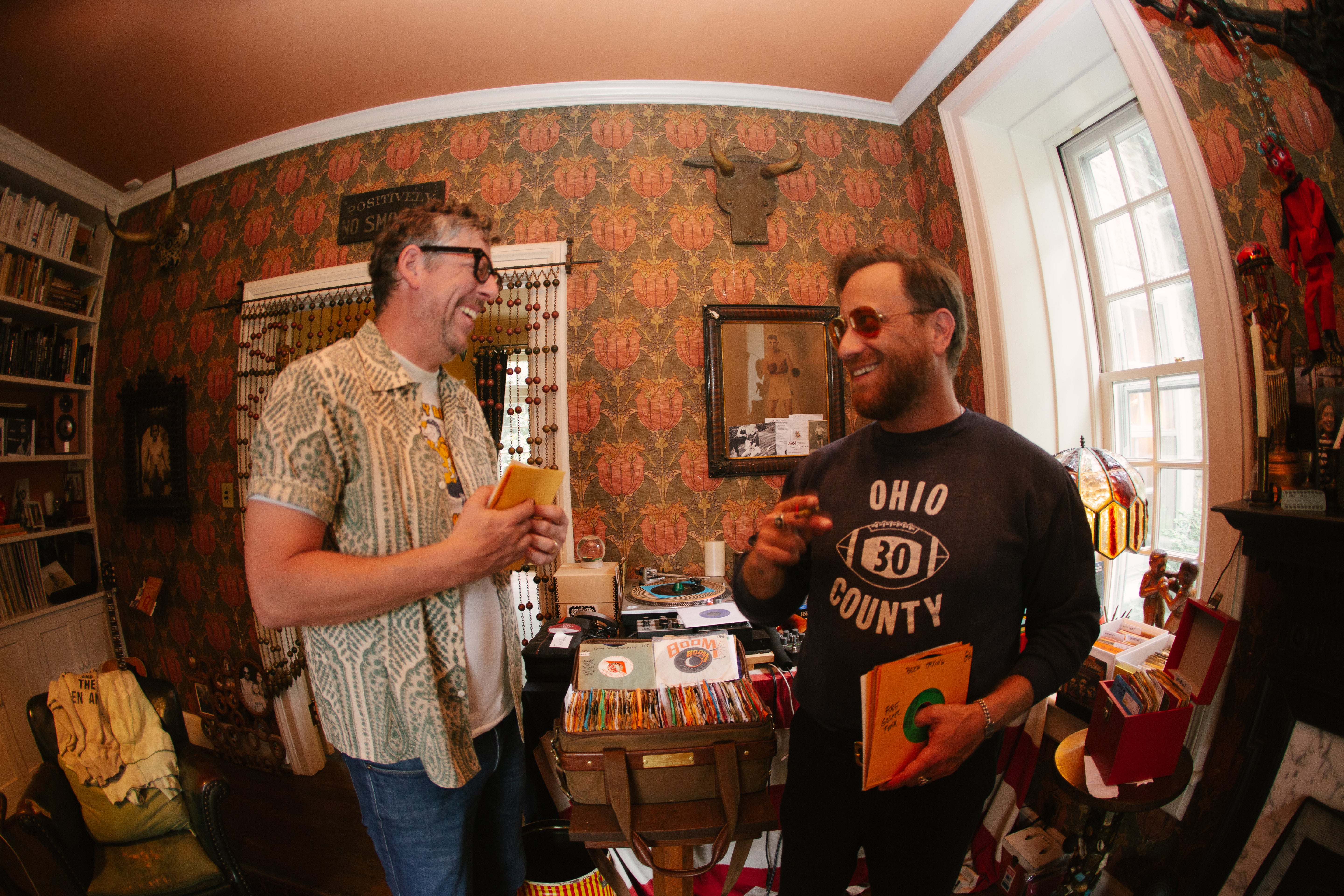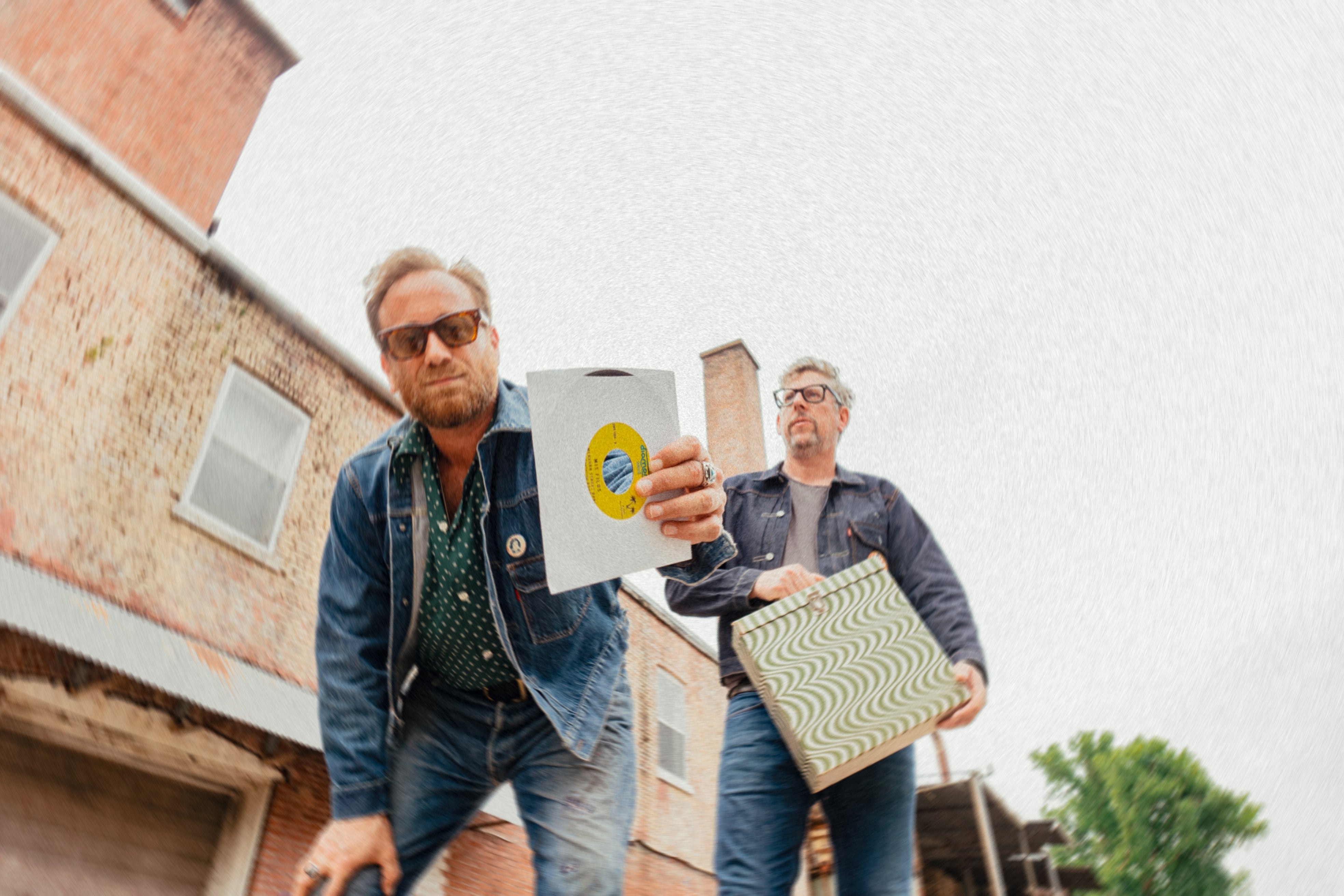The Black Keys on their music industry nightmare: ‘We were angry. We wanted vengeance’

On their recent UK tour, The Black Keys found themselves swept up in the champagne supernova. “We were in Manchester for a couple days right before [Oasis’s] first show there,” says the bold and bespectacled drumming half of the Ohio-via-Nashville garage rock duo, Patrick Carney. “Getting to feel a whole country excited and pumped for a rock band reunion… it was kind of insane. It was amazing.”
“We’ve never really seen anything like it,” chuckles his quieter, more reticent singer-guitarist bandmate Dan Auerbach. But beneath the congratulatory awe, a certain injustice seethes. Recently, Carney missed a local show by his friends Mumford & Sons because news of the gig hadn’t cut through the internet’s blanket big-gig coverage to reach him. “It’s just Oasis,” he says, ensconced today in a sweltering South Carolina. “Everybody in the world knows Oasis was playing Wembley this weekend, but that just takes up so much bandwidth – and rightfully so – on your algorithm.” He considers the plight of the many less-supersonic acts fighting for feed space. “It’s a weird time, man. How are you supposed to get the word out?”
It’s a raw topic for a band emerging, with 13th album No Rain, No Flowers, from a turbulent few years of teetering at the top. The Black Keys have been an arena act since their breakthrough albums Brothers (2010) and El Camino (2011), each topping 2 million sales, made them the world’s foremost post-White Stripes garage blues duo and ad sync favourites. Where the Stripes had revitalised antique Mississippi blues with punkish passion and blown-amp impact, infectious retro blasts such as “Lonely Boy” and “Gold on the Ceiling” added a Seventies soul lustre and a dusty southern edge, as suited to the Tennessee roadhouse as the gospel chapel.
For much of the 2010s, The Black Keys reigned supreme as the definitive sound of US indie retro rock. But last year, they were forced to cancel an entire North American tour, sack their manager and play a controversial crypto gig to recoup lost income. “We got f***ed,” Carney tweeted, and later explained that underselling shows in riskier cities hadn’t been downsized as promised by their “poorly organised” management. At the time, a rep for their management said it was an “amicable parting”. The more The Black Keys exposed the dispute in the press, the more they whistle-blew on a monopolistic industry working surreptitiously against the artist.
“Everybody told us not to,” Auerbach says, but Carney, in full heroic voice today, is unafraid of the consequences. “It’s definitely gonna affect our work in America, until it changes,” he says. “But most people don’t know. The game has changed over here in the United States. We just don’t connect the dots.”
He asserts that major promotion company Live Nation has financial links with large swathes of the music industry, and he believes that creates fundamental conflicts of interest. “You see, like, ‘Jay-Z started a management company with Live Nation’, [but] no one really understands what that actually means,” he says. “So the people that you’re supposed to be working with to negotiate with your promoter are in the pocket of the promoter. So how the f*** are you supposed to work? It’s everywhere…it’s insidious. It’s f***ed up.”

This year’s Black Keys shows have been a refreshing return to the stage, playing open-air and festival gigs to some of the biggest crowds of their career. “We played this festival in Valencia, one of the last shows, 45,000 people going bananas the whole time,” Carney says. But despite the new album’s philosophical and optimistic title track – “the damage is done/ It won’t be long ’til we’re back in the sun”, Auerbach sings over some bright-side electro-rock – they’re still fuming over last year’s turmoil. “It’s not something that we’ve ever had happen to us before, and it’s been very hard to get over it, just mentally,” Auerbach says. “It really is eating at both of us. I guess [the album’s title track] is trying to put a positive spin on that type of situation, any type of situation. But that’s not necessarily how we were feeling. I mean, we were angry. We wanted vengeance. But we wrote ‘No Rain, No Flowers’. I don’t necessarily know why.” Maturing into their music may have helped. “Pat and I both have kids now, and maybe p***ing and moaning about our troubles directly, like a f***ing diary, is just not what we want to do. It’s not the legacy we want to leave for our kids.”
The record’s broad and rich retro strokes – a hazy wash of southern soul, Sixties psychedelia, modernist blues, Motown and crackling country rock – was influenced by the pair’s recent Record Hangs, vinyl dance parties held across the US and Europe at which the duo would play only old 45-inch singles. “We each carry a record bag that has like 120 45s in it,” Carney says. “In that bag there will be some garage rock, some soul, some funk. Dan carries a lot of cumbia stuff. And occasionally there’s a hip-hop song or a pre-disco song.” It recalled their formative Noughties years when these childhood friends from Akron toured the US in a van they dubbed the Grey Ghost, whiling away “eight-hour hell-drives” between clubs by introducing each other to their favourite CDs.
“It was like this big adventure,” Carney says. “We were two kids in love with music [and] our tastes started becoming more in unison, and broader. I remember that first tour, Dan playing me a ton of blues stuff that I actually really loved, and then I would show him Spiritualized or Modest Mouse. And we’d find these compilations, like this soul jazz New Orleans funk comp and just wear it the f*** out. It was just this discovery of music. That is still the basis of our friendship.”
Enjoy unlimited access to 100 million ad-free songs and podcasts with Amazon Music
Sign up now for a 30-day free trial. Terms apply.
Try for free
ADVERTISEMENT. If you sign up to this service we will earn commission. This revenue helps to fund journalism across The Independent.
Enjoy unlimited access to 100 million ad-free songs and podcasts with Amazon Music
Sign up now for a 30-day free trial. Terms apply.
Try for free
ADVERTISEMENT. If you sign up to this service we will earn commission. This revenue helps to fund journalism across The Independent.

In the spirit of the Record Hangs, the 18 songs they recorded for the album run the gamut from Philly soul to Latin dance to New Order. “Listening back to the whole group of songs,” says Carney, “it was almost psychotic.” The album’s colourful cast – the night-crawling lothario of “Man on a Mission” or the hungover hedonist of “The Night Before”, say – also act as homages to the character sketches of the old Motown and Creedence Clearwater Revival singles they were dropping. “We want the song to tell a story,” says Auerbach, “but it’s not necessarily our story.”
The Black Keys’ story has inevitably become wrapped up in music industry exploitation. In 2015, at the height of their success, they entered a four-year hiatus, exhausted by the crush and churn of the album-tour cycle. “We had climbed the mountain and what we were seeing at the top was the ability just to keep repeating the process – and that didn’t seem enticing,” Carney says. “We were doing that for [2014’s] Turn Blue when I broke my shoulder. That moment where we had to cancel Australia and Europe halfway through was the moment where it was like ‘Oh, it feels good to not have to be gone for a year.’”
There’s much talk now of touring becoming financially unfeasible for most bands, even at the upper levels. “Yeah, it’s getting exceedingly expensive,” Carney says. “Ticket prices are soaring, but the money’s not necessarily trickling down into more profit or anything.” He recalls early tours spent sleeping in vans and living like “cockroaches” to get by on fifty-dollar gig fees. “But it was definitely a different time. And us being a two-piece made it much easier. One of our first tours was just the two of us in a sedan, all of our gear.”
UK singer-songwriter Billie Marten recently claimed that “mostly, artists are in financial ruin; we’re all paying Taylor Swift”. Fair point? “When you’re a big artist like Taylor, you’re able to negotiate powerful deals,” Carney says. “It’s a different business that she operates in than most of us operate in.”

On tour, he argues, the artist takes on all of the risk, paying for everything from venue to crew to PA. “But each time you’re playing a show, someone’s slapping these service fees on, they’re taking 25 per cent of your merch off the top, it’s a f***ing racket, man. You would think over the course of 65, 75 years of rock’n’roll, someone would have stepped in and be like, ‘F*** all this shit. This is insane,’ and I think most managers would, but they’ve all been compromised.”
The value of Spotify, Carney claims, has risen from $25bn to $165bn in the past three years. The specific figure recently reported by Billboard is almost $161bn, but close enough. “There’s a lot of money in music; it’s creating billionaires. It’s just, we’ve been saying since 2010, that this s*** just doesn’t pay fairly. It’s insane.” And it’s a pattern he sees repeated across US society: the super-rich, rather than any particular politician, driving the world into the ground. “A lot of politics is a huge distraction from some other s*** that’s going on,” he says. “In America, you’ve had all this power aggregated by billionaires, and no one’s stepping in to fix that. If you have money here, you can get anything done and that’s really f***ing unnerving. It seems like people have a little bit more of a voice in the UK and France, for instance. But here it is a game of money, and anybody who doesn’t have it is losing.”
Almost by default, The Black Keys have found themselves at the forefront of the good fight against the conglomerate hegemony, and they know there are tough battles ahead. “We still have dues to pay,” Carney says. “We still have a service to the fans, to get out there and put on a good show.” In the meantime, the rain is receding, the flowers budding soon. “Good things have come out of every period that we’ve gone through,” says Auerbach. “Essentially, Pat and I were given this gift that we’re able to make music together, and it’s never let us down.”
‘No Rain, No Flowers’ is out now




